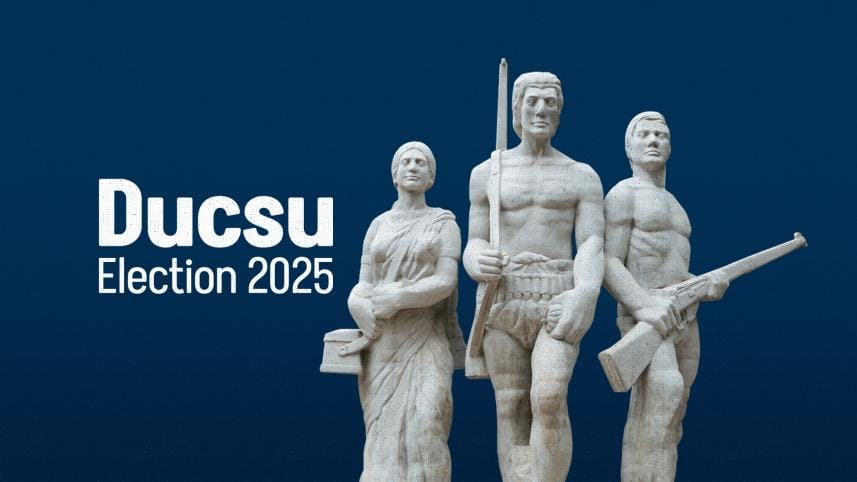How Chhatra Dal lost Ducsu

It was not a loss. It was a collapse. The Ducsu election showed how far Chhatra Dal has fallen. Once they were known across the campus. But this time around, they could not win even a single seat at the central student body.
Their defeat was not surprising though. It was the result of years of weakness, mistakes, being unprepared, and disorganisation. It exposed their structural decay, their failure to reform, and their inability to reconnect with the very students they claim to represent.
The numbers prove it. Islami Chhatra Shibir's Md Abu Shadik Kayem became vice president with 14,042 votes. Chhatra Dal's candidate, Abidul Islam Khan, only got 5,708. It was less than half of Shadik's votes. He was nowhere close to a threat. This was not a fight. This was humiliation. It was a landslide rejection that proved Chhatra Dal is no longer even a secondary force in campus politics.
But why did they fail so badly?
Chhatra Dal started late. Their VP candidate was announced on 20 August, only three weeks before voting. Shibir had been working since the August 5 uprising. Chhatra Dal entered the game too late and too unprepared. This delay showed a complete lack of planning, vision, and seriousness about the election.
For years under the Awami League, Chhatra Dal had disappeared from Dhaka University. Activists were missing from halls, leaving students to fight their struggles alone. They only returned about a year ago, while Shibir had already rebuilt networks and earned students' trust. Abandoning the campus for so long created a vacuum, and when they came back, students saw them as outsiders rather than leaders.
Abidul Islam tried to campaign hard, but he could not escape his organisation's poor image. Students still remembered past controversies linked to Chhatra Dal. Campaigning without credibility is meaningless, and Abidul's effort collapsed under the weight of history.
More importantly, the question is: was Abidul Islam the right person to contest against Shadik? Maybe not. Choosing a weak candidate against a strong rival was political suicide, another sign that Chhatra Dal's leadership has lost all sense of strategy.
Shadik was already a well-known leader from the July uprising and was popular in the halls. Every student across the campus knew him. University clubs, events, even teachers knew him well. One looked like a strong choice, the other like a weak replacement. The contrast could not have been sharper, and students voted accordingly.
Students don't see Chhatra Dal as an independent organisation anymore. They see it as just BNP's puppet. BNP's own problems—divisions, weak control, and lack of clear direction—hurt Chhatra Dal directly. Without freedom to make decisions or bring in new leaders, the group looked old, tired, and irrelevant.
In the new political context, intellectual debate and discussion are very important. But Chhatra Dal leaders are far removed from it. Other student organisations, including Shibir, have leaders closer to students' age and understand the students' pulse better. Chhatra Dal's leadership looks disconnected, elitist, and absent from the conversations that shape student life today.
New student groups and independent candidates also pulled votes. A smart organisation would have made alliances or seat-sharing deals. Chhatra Dal did nothing. They stood alone, even while knowing they were behind. Politics is an art of compromise. Politics punishes those who refuse to adjust. Their arrogance in isolation only deepened their defeat.
While Chhatra Dal stayed inactive, Shibir worked hard. They arranged iftar parties, joined student protests, and ran everyday hall activities. Even students who didn't support Shibir's politics saw them as a consistent presence. Chhatra Dal offered no such connection. Presence builds trust; absence breeds irrelevance.
Perhaps the biggest reason was their failure to win over young voters. Shibir used social media, modern political language, and fresh campaign ideas. Chhatra Dal looked outdated, disconnected, and silent on issues that matter to new students. For a generation that wants relevance, Chhatra Dal had nothing to say. A student organisation that cannot speak the language of students is already finished.
Even after the defeat, Abidul said, "Abid will never leave you." Nice words. It would have been far more apt for Abid to say, "Please don't leave Chhatra Dal." Because the students already have.

 For all latest news, follow The Daily Star's Google News channel.
For all latest news, follow The Daily Star's Google News channel.
Comments